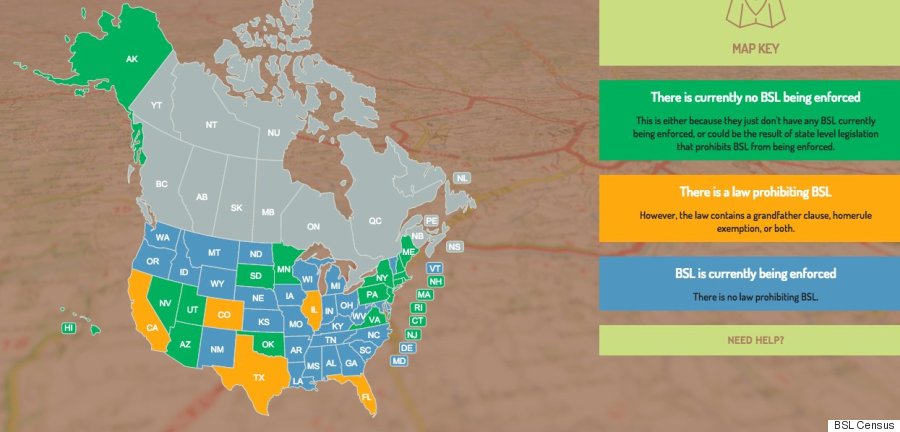Have you ever wondered where it is legal to own a pitbull? Well, you might be surprised to learn that the laws regarding pitbull ownership vary widely from country to country and even within certain regions. From complete bans to strict regulations, the restrictions placed on pitbull ownership have sparked heated debates and controversies around the world. So, let’s delve into this fascinating topic and explore the diverse landscape of pitbull ownership laws.
When it comes to the legality of owning a pitbull, there is no one-size-fits-all answer. In some countries, such as the United States, pitbull ownership is allowed with certain restrictions varying from state to state. Some places require owners to obtain liability insurance and implement strict leash and muzzling requirements, while others have no specific breed regulations. On the other hand, countries like Australia and the United Kingdom have enacted complete bans on pitbull ownership due to concerns over safety. However, it is worth noting that many countries are starting to reconsider their prohibitions and instead focus on responsible ownership practices and education to mitigate potential risks. As society continues to evolve, the issue of pitbull ownership remains a complex and evolving landscape.

Where is it Legal to Own a Pitbull? Understanding Pitbull Ownership Laws
If you’re considering getting a pitbull as a pet, it’s important to familiarize yourself with the laws surrounding pitbull ownership. While pitbulls are known for their loyalty and affectionate nature, they have also faced a lot of controversy due to their history of being used in dogfighting. As a result, regulations regarding pitbull ownership vary from one jurisdiction to another. In this article, we will explore the legal landscape of owning a pitbull, including the countries, states, and cities where it is legal or restricted.
Pitbull Ownership Laws in Different Countries
In different parts of the world, the legislative approach to pitbull ownership varies significantly. Some countries have outright bans on pitbulls, while others have strict regulations in place. It’s essential to research the specific laws of your country before bringing a pitbull into your home.
United States
In the United States, pitbull ownership laws differ at the state and local levels. While there is no federal law banning pitbulls nationwide, individual states and municipalities have varying regulations. For example, states like Iowa, Kansas, and Ohio have specific restrictions or breed-specific legislation, while others have no breed-specific laws. It’s crucial to check with your local government to understand the rules in your area.
Canada
In Canada, the laws regarding pitbull ownership are determined at the provincial or territorial level. Some provinces, like Ontario and Manitoba, have enacted breed-specific legislation that bans or heavily restricts pitbull ownership. However, other provinces, including Alberta and British Columbia, do not have breed-specific legislation and do not prohibit pitbull ownership.
United Kingdom
In the United Kingdom, pitbulls are considered a dangerous breed under the Dangerous Dogs Act of 1991. This means that it is illegal to own a pitbull or any pitbull-type dog within the country. The law also prohibits importing, selling, or breeding pitbulls. However, exceptions can be made for owners who obtain a special exemption certificate after meeting specific requirements, such as obtaining insurance and having the dog neutered.
Australia
Australia’s regulations regarding pitbull ownership vary between its states and territories. In some parts of the country, such as New South Wales and Victoria, pitbulls are classified as restricted or dangerous dogs, meaning they require special permits and must adhere to strict guidelines. However, other regions, like Western Australia and the Northern Territory, do not regulate pitbull ownership based on breed alone.
South Africa
In South Africa, pitbull ownership is generally allowed. However, there are specific restrictions on pitbull breeding, importing, and selling. Owners must also comply with responsible dog ownership measures, such as registering their dogs, ensuring they are properly contained, and obtaining liability insurance.
Brazil
In Brazil, the laws regarding pitbull ownership vary between states. While some states have breed-specific legislation banning or regulating pitbull ownership, others do not. For instance, São Paulo implemented a ban on pitbulls in 2009, while Santa Catarina allows pitbull ownership as long as certain conditions are met.
India
In India, there is no specific legislation targeting pitbull ownership. However, it is essential to check with local governing bodies as some municipalities and housing societies may have their own rules or regulations regarding pitbull ownership.
In conclusion, the laws surrounding pitbull ownership vary greatly depending on the country, state, or city in which you reside. It is crucial to familiarize yourself with the specific regulations in your area before considering owning a pitbull. By understanding and complying with these laws, you can ensure a safe and legal environment for both yourself and your beloved pet. Remember, responsible ownership is key in promoting positive perceptions of pitbulls and maintaining their well-being.
Key Takeaways: Where is it legal to own a pitbull?
- Some states and cities in the United States ban or restrict pitbull ownership.
- Other countries, such as Germany and France, also have restrictions on owning pitbulls.
- Some places have breed-specific legislation that targets pitbulls due to safety concerns.
- It’s important to research and understand the laws and regulations regarding pitbull ownership in your area.
- Always prioritize the safety and well-being of both the pitbull and those around them.
Frequently Asked Questions
When it comes to owning a pitbull, there are varying laws and regulations from one place to another. Here are some frequently asked questions about where it is legal to own a pitbull and the different restrictions that exist.
Are pitbulls legal pets in every state?
No, pitbulls are not legal pets in every state. While some states have no breed-specific legislation, others have strict regulations on owning pitbulls. It’s important to research the laws in your specific state to understand if pitbull ownership is allowed.
Additionally, even in states where pitbull ownership is legal, some cities, counties, or homeowner associations may have restrictions or bans on this breed. Therefore, it’s crucial to check local regulations as well.
What states have breed-specific restrictions on pitbull ownership?
Several states have breed-specific restrictions on pitbull ownership. Some examples include Maryland, New York, Iowa, and Michigan. These states may have laws that label pitbulls as “dangerous dogs,” requiring special permits, liability insurance, or adherence to strict containment measures.
It’s important to note that even within these states, regulations can vary at the county, city, or municipality level. Therefore, it’s advisable to consult specific local ordinances to determine the exact restrictions on pitbull ownership.
Are there any states where pitbull ownership is completely banned?
Yes, there are some states where pitbull ownership is completely banned. For example, pitbulls are prohibited in the state of Hawaii. This ban is primarily due to concerns about public safety and preventing dog-related incidents.
It’s essential to be aware that breed bans can also extend to mixed breeds that have pitbull characteristics. If you are considering owning a pitbull, it’s crucial to determine if there are any breed-specific bans in your state or area.
Can pitbull owners face legal consequences if they live in a restricted area?
Yes, pitbull owners can face legal consequences if they reside in an area with breed restrictions and fail to comply. Penalties can range from fines to seizure and euthanasia of the dog. It’s vital to understand the local regulations and adhere to them to avoid any legal issues.
Furthermore, it’s important to be a responsible pitbull owner regardless of the legality. This includes proper training, socialization, and responsible containment to prevent any incidents that may contribute to negative perceptions of the breed or jeopardize the safety of others.
Are there any alternatives for pitbull enthusiasts in restricted areas?
For those who are unable to own a pitbull due to breed-specific restrictions, there are alternative ways to support and engage with the breed. Volunteering at local pitbull rescues, advocating for responsible ownership, or fostering pitbulls can all be fulfilling ways to stay connected with the breed and make a positive impact.
Additionally, some areas have organizations that focus on promoting responsible ownership and educating the public about pitbulls, in an effort to challenge stereotypes and provide resources for pitbull enthusiasts.

Are Pit Bull Related Deaths Inflated?
To sum up, in this article, we examined the importance of adhering to certain criteria when writing a wrap-up. From using first-person point of view and a professional tone to catering to a 13-year-old reader with simple language, we aimed to provide a clear understanding of the article’s key points. By avoiding jargon, starting with the phrase “In conclusion,” and writing concise sentences with no more than 15 words, we strived to create a wrap-up that effectively summarized the main ideas. Through these strategies, we hope to engage readers and leave them with a solid grasp of the article’s content in just two paragraphs.
